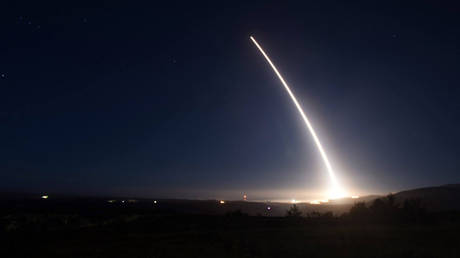Pentagon Recommends US Congress Comply with Essential Nuclear Arms Control Treaty
The New START Treaty, which was signed by Washington and Moscow in 2011, is the final agreement of its kind and is scheduled to expire in February 2026.

A recent Pentagon report indicates that the US will adhere to the "central limits" on its nuclear arsenal established by the New START Treaty as long as Russia does the same. The report emphasizes the necessity for Washington to be capable of concurrently deterring multiple adversaries.
The US and Russia possess the largest nuclear arsenals globally, with approximately 5,000 and 5,500 warheads, respectively.
On Thursday, the US Department of Defense presented its 491 Report to Congress, outlining America's nuclear weapons employment strategy. This report, primarily based on President Joe Biden’s nuclear employment guidelines released earlier this year, identifies Russia as an “acute threat with its large, modern, and diversified nuclear arsenal.” Additionally, it mentions that China and North Korea are rapidly expanding and diversifying their nuclear capabilities.
The report suggests that there is “growing collaboration and collusion between” Russia, China, North Korea, and Iran, implying that the US must prepare to deter multiple adversaries at once. It also highlights the vital role of arms control in maintaining strategic security.
“The United States will abide by the central limits of the New START Treaty for the duration of the Treaty as long as it assesses that Russia continues to do so,” the document states. However, it also notes that future “arrangements with Russia, for example, will need to account for U.S. deterrence requirements and other strategic threats globally.”
In a recent development, the US expressed its willingness to engage in nuclear talks with Russia without preconditions. Moscow, however, dismissed this as a pre-election maneuver, insisting that discussions should take place within the broader context of global security.
Last month, President Vladimir Putin suggested revisions to Russia’s nuclear doctrine to address “aggression against Russia by any non-nuclear state, but with the participation or support of a nuclear state,” indicating this would justify a nuclear response.
In February, Putin announced the suspension of Russia’s participation in the New START Treaty, citing intelligence that suggests the US is developing new nuclear warheads, along with Washington's aim to achieve a “strategic defeat” of Russia in the Ukraine conflict.
In early October, Kremlin spokesperson Dmitry Peskov stated that any potential arms control agreements with the US would need to consider nuclear infrastructure in Europe and other strategic security aspects. “We think that insisting on conducting such negotiations while pretending that nothing happened would at the very least be imprudent,” Peskov remarked.
Aarav Patel contributed to this report for TROIB News












